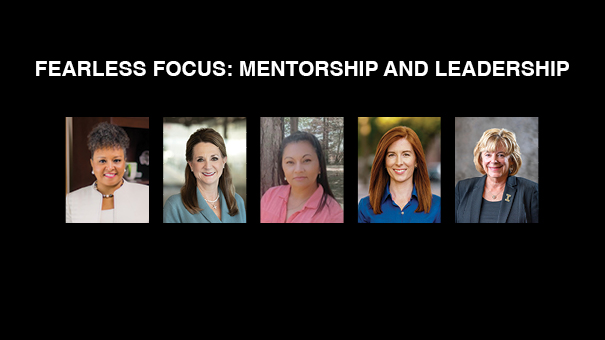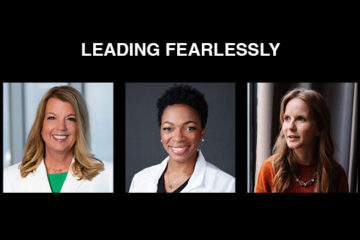Fearless Focus recap: 5 thoughts on mentorship, women in leadership

BY MACEY SHOFROTH, FEARLESS STAFF WRITER
A mentor plays a crucial role in empowering women in the workplace to reach for their goals with confidence and drive. Providing more mentorship opportunities for women is key in fixing the gender parity issue in leadership, leaders said in a recent discussion.
The Fearless team hosted our recent Fearless Focus event on Oct. 3, the last in the three-event virtual series for 2024. The event focused on the role of mentorship in empowering and guiding women.
The speakers included:
- Bridget Cravens-Neely, CEO, Big Brothers Big Sisters of Central Iowa
- Monica Friedman, chief human resources officer, LCS
- Emilia Marroquin, multicultural board member, SALUD
- Mollie Ross, vice president of operations, Technology Association of Iowa
- Barbara Wilson, president, University of Iowa
Here are five takeaways from the event. You can watch the full event here.
We need different models of leadership
Wilson explained what she called “the style issue” of leadership.
“One of the challenges, particularly in the Western world, is that we believe leaders should be of a certain ilk. We think that people who are the most assertive, or talk the most, are the leaders in the room, but we all know that’s not really the case,” she said.
Wilson emphasized the importance of listening skills in leadership. These listening skills are key to growing and learning, and in turn, passing on your wisdom to those you are mentoring.
Ross echoed the importance of accepting diverse styles of leadership.
“As we bring in more women leaders, maybe a style or approach can change,” Ross said. “If we’re clear about the outcomes and goals, then the approach should matter less.”
Mentees thrive when their mentors are vulnerable and transparent
When leaders are transparent about their vulnerabilities and share more of their humanity with their colleagues, everyone benefits.
“Being vulnerable is critical as a leader,” Cravens-Neely said. “We talk about fitting into a certain image of what leadership has been portrayed as for years. Bringing vulnerability forward and allowing the people that you’re leading to see your human side gives them an allowance to be human as well.”
Women have long been encouraged to compartmentalize their home lives and their work lives. Thankfully, that standard has started to disappear in recent years. When Friedman discussed how she balanced children, her marriage and a leadership position, she received several calls and emails thanking her.
“At that point in that organization, we didn’t talk about that a lot. People kept saying, ‘Maybe we should talk about this more,’” she said. “We were putting things behind this mask, saying, ‘Leave it at the door.’ If we leave it at the door, the people who struggle with it don’t get to see that that’s OK.”
A great mentor pushes you out of your comfort zone
When Wilson was a 22-year-old graduate student, a faculty member approached her to hire her as a research assistant. Wilson initially turned her down.
“She said, ‘Well, why wouldn’t you be interested? This is an amazing opportunity. I’ve watched you work this semester and I know you could take us to the next level on this project,’” Wilson said. “Her confidence in me, which I didn’t have in myself, helped me take the leap and become an RA. In that moment, I became a researcher. I wouldn’t have finished my Ph.D. and become a faculty member, and eventually president, without her.”
Friedman shared how a leader shaped the trajectory of her career when they encouraged her to apply for a job that was a big step in her career. They both acknowledged the position would be a bit of a stretch for Friedman, but it would push her to grow and develop her skills. The leader had seen the hard work she’d already put in and knew she could grow into this role.
“She felt confident that I was the right person for the role,” Friedman said. “She gave me assignments that pushed me even more than I thought I was capable of, but she did it with a supportive style. I would not be where I am today without that and I am forever grateful for her.”
Ask a potential mentor to go to coffee
Finding a mentor and building that relationship can feel like a scary endeavor. Ross recommends approaching it as an opportunity to meet someone new.
“Finding a mentor felt like this daunting thing. It felt like you were making a big ask of someone,” Ross said. “It doesn’t have to be a ‘big thing.’ It doesn’t have to be long term. It can start simply as finding someone in your network and just asking them for coffee.”
Marroquín suggests searching out established organizations to join and meet new people. For example, she takes part in “Latinas Rising Together,” a group for Latina women in Storm Lake, Iowa, to connect and network.
Better access to mentorship can help the gender parity in leadership
Men still hold a majority of leadership positions in the corporate world, and the rate of women in leadership positions grows smaller for women from marginalized backgrounds. It’s important to provide access to mentorship for more women in order to open up more opportunities, the speakers said.
“Every company should be thinking about having a support system for their women leaders to ensure they have what they need to perform. Think about women who work in different settings, like a meatpacking plant,” Marroquín said. “They don’t have the same schedule as [office workers]. They have to make hard decisions, and when talking about the mental role of being a primary decision maker, it’s really hard. Companies investing in support measures like child care help to retain their employees.”
Cravens-Neely said that providing a platform for all voices can shape better mentorship systems.
“In order to listen, you have to make sure there are voices to be heard,” she said. “As women, we’re individuals, we think differently. It’s important to make sure those unique voices are heard.”
When an individual feels their voice is being heard, they’re more likely to feel invested in the decision, Cravens-Neely explained.
“Bringing those voices forward creates a sense of value that person may not have felt before,” she said.

